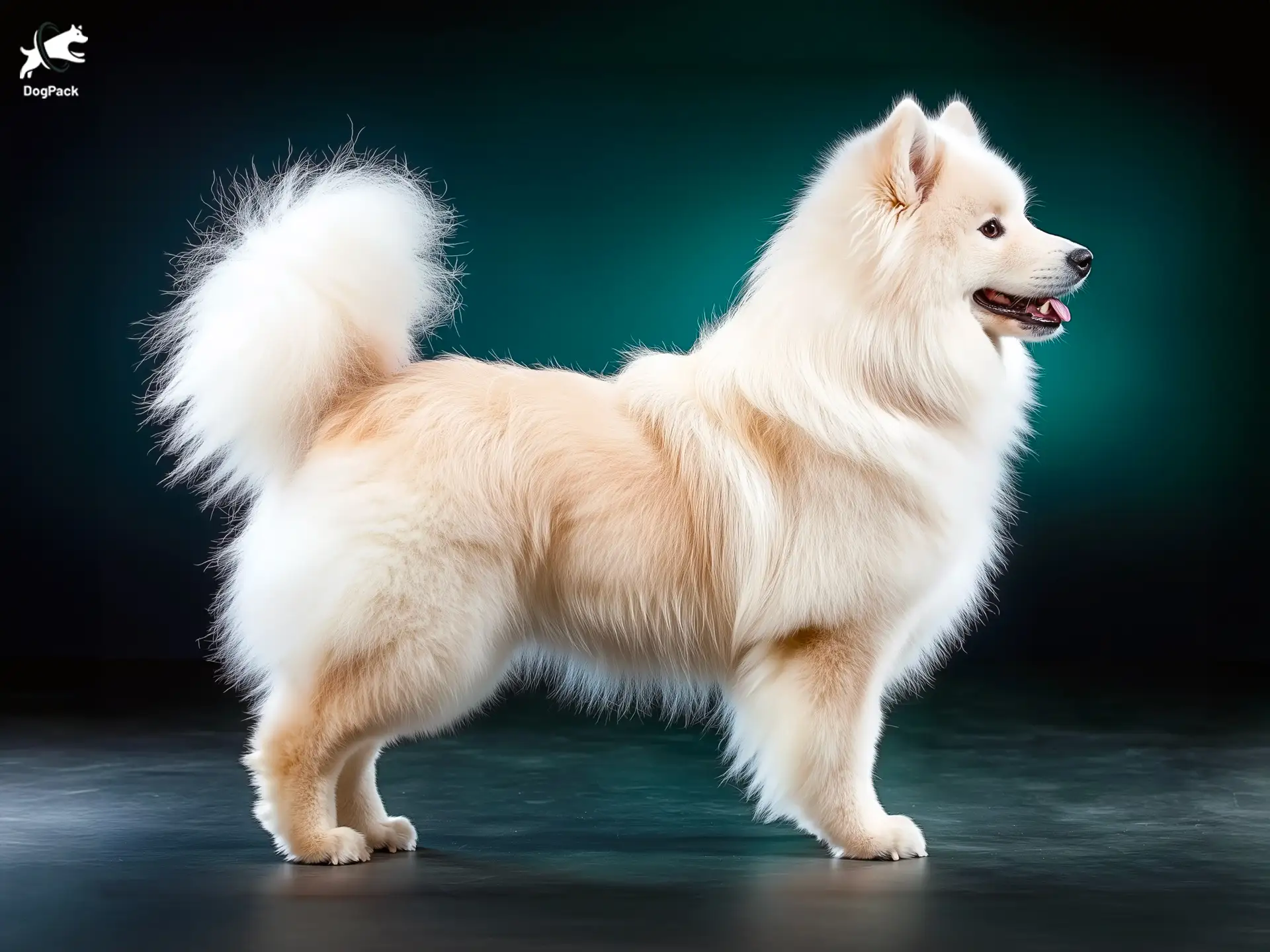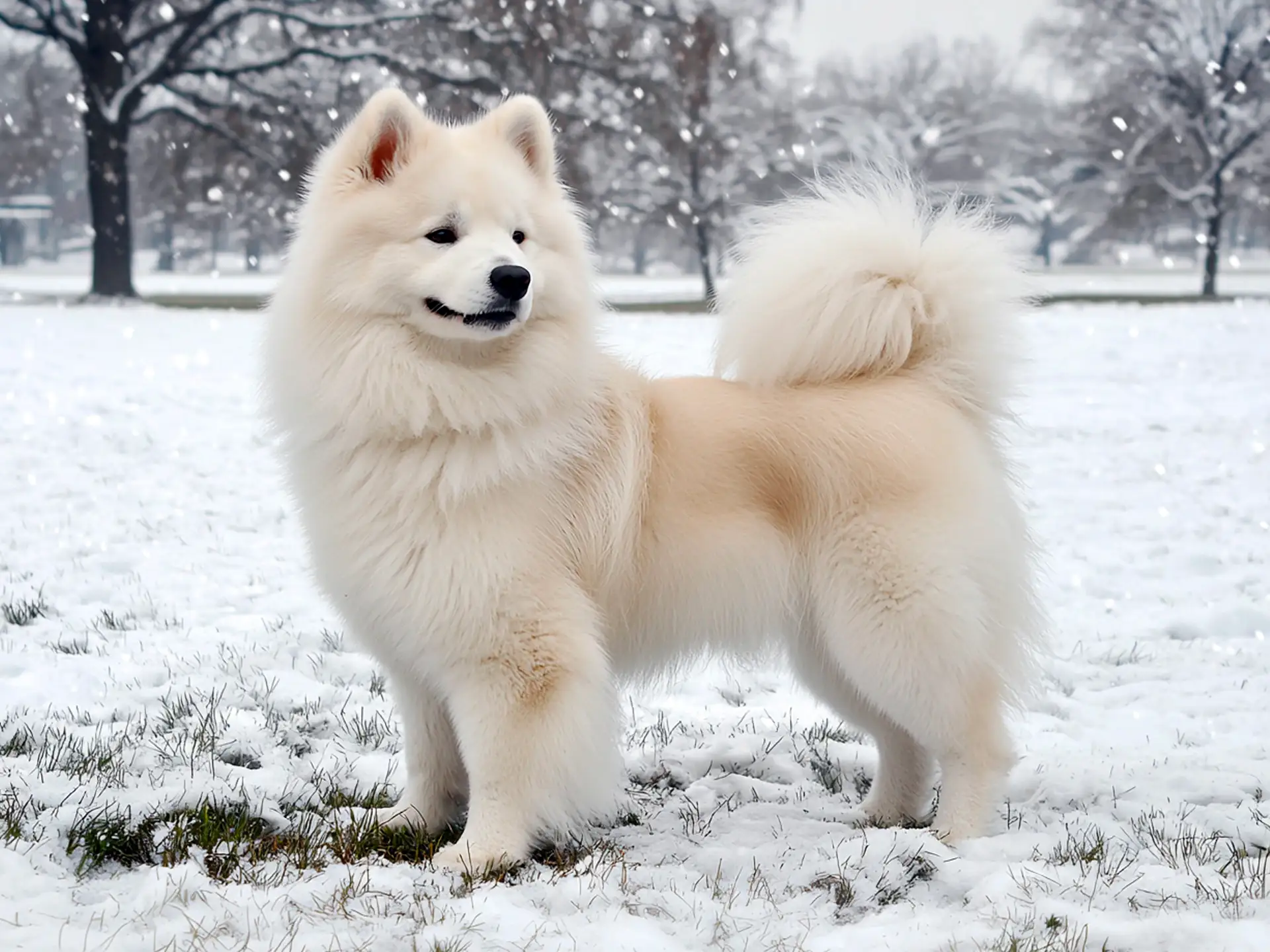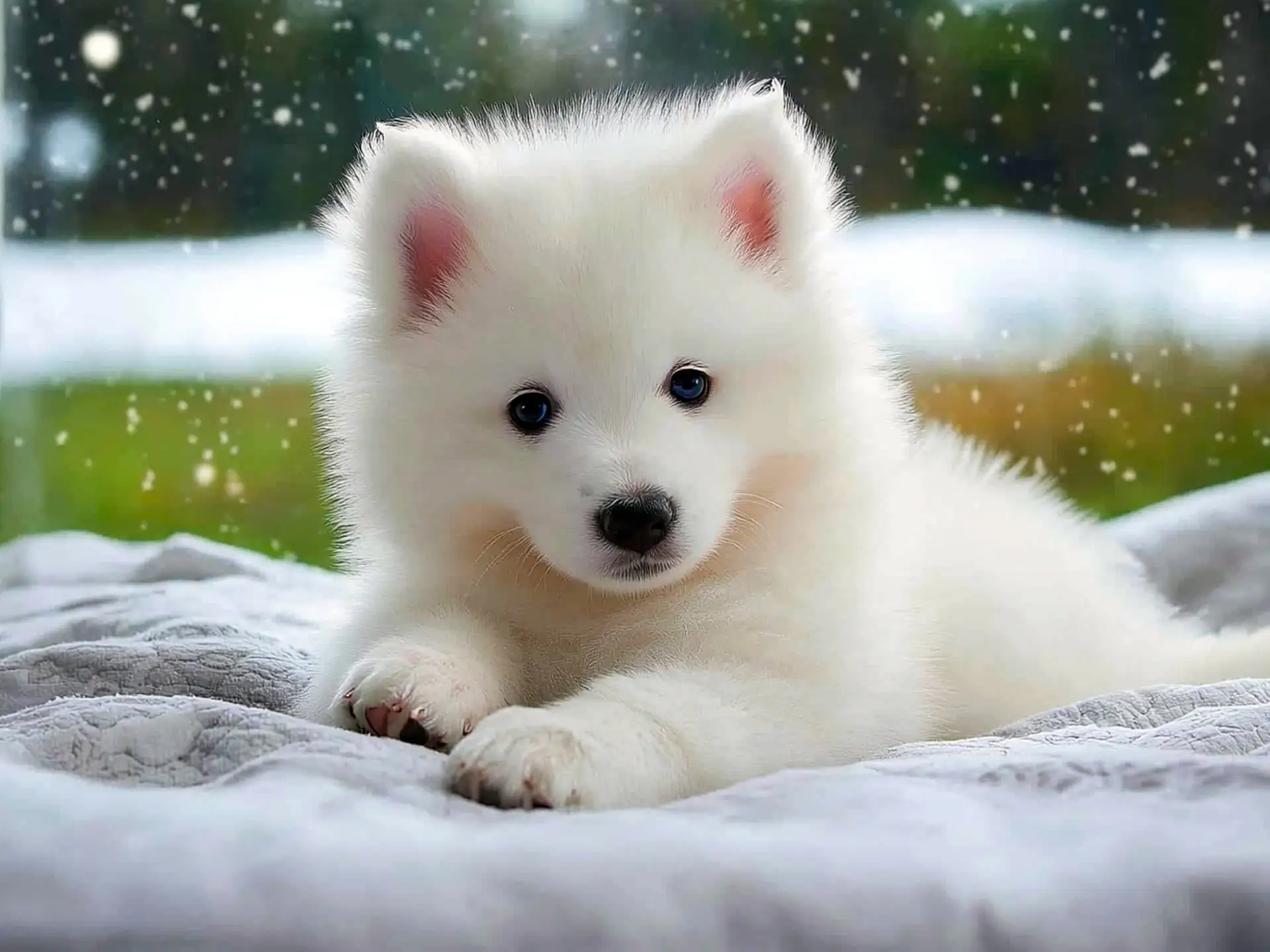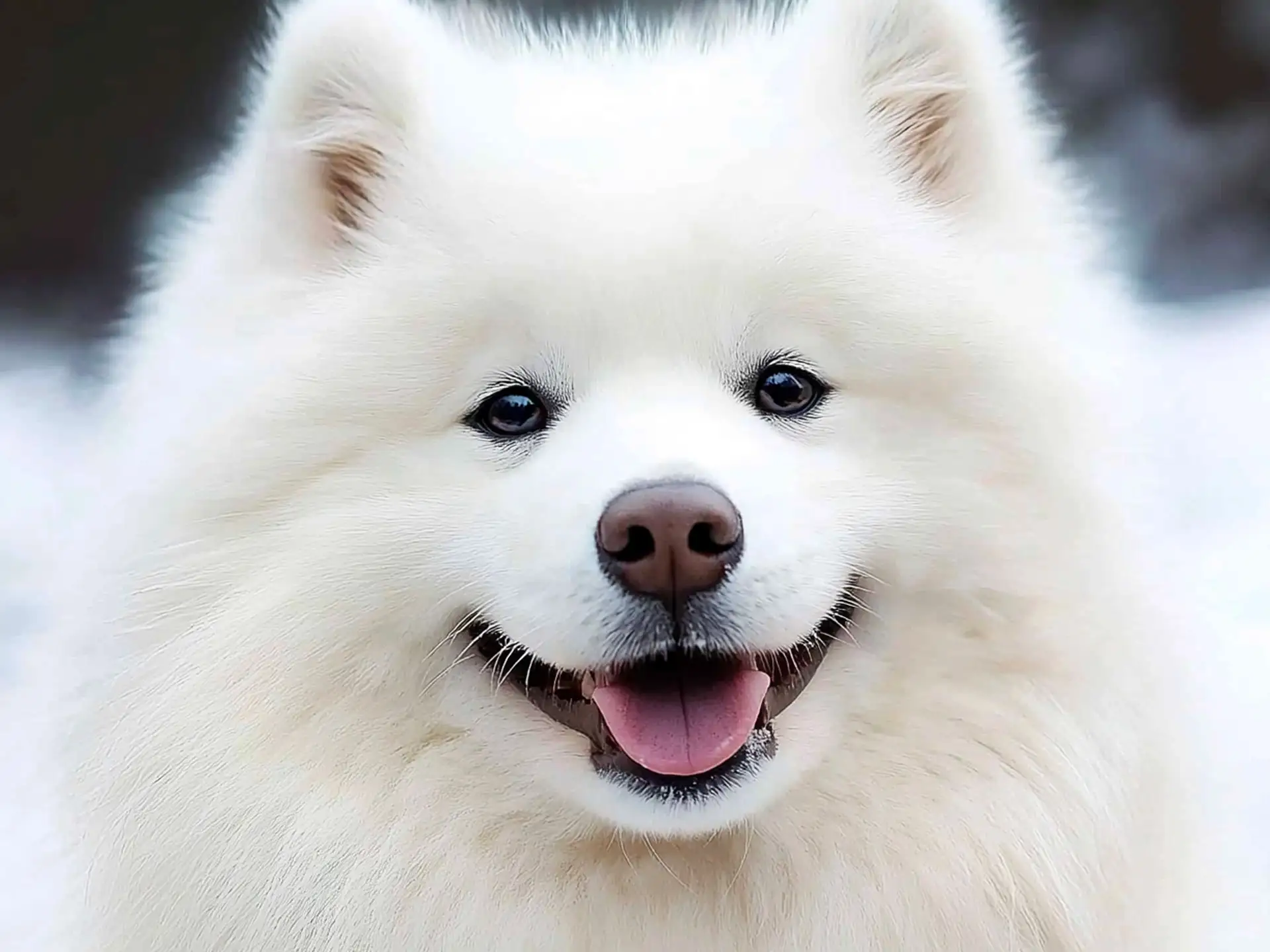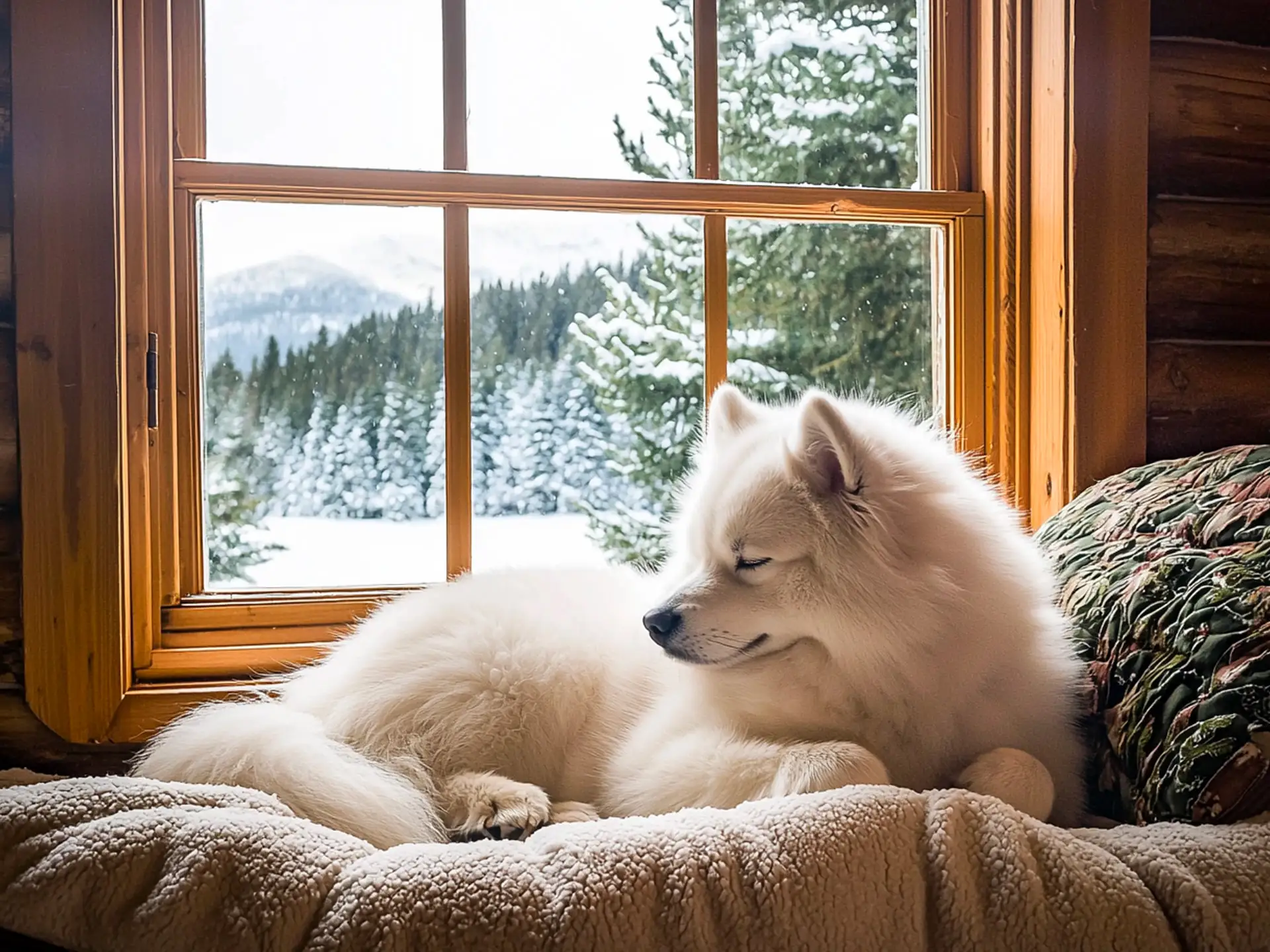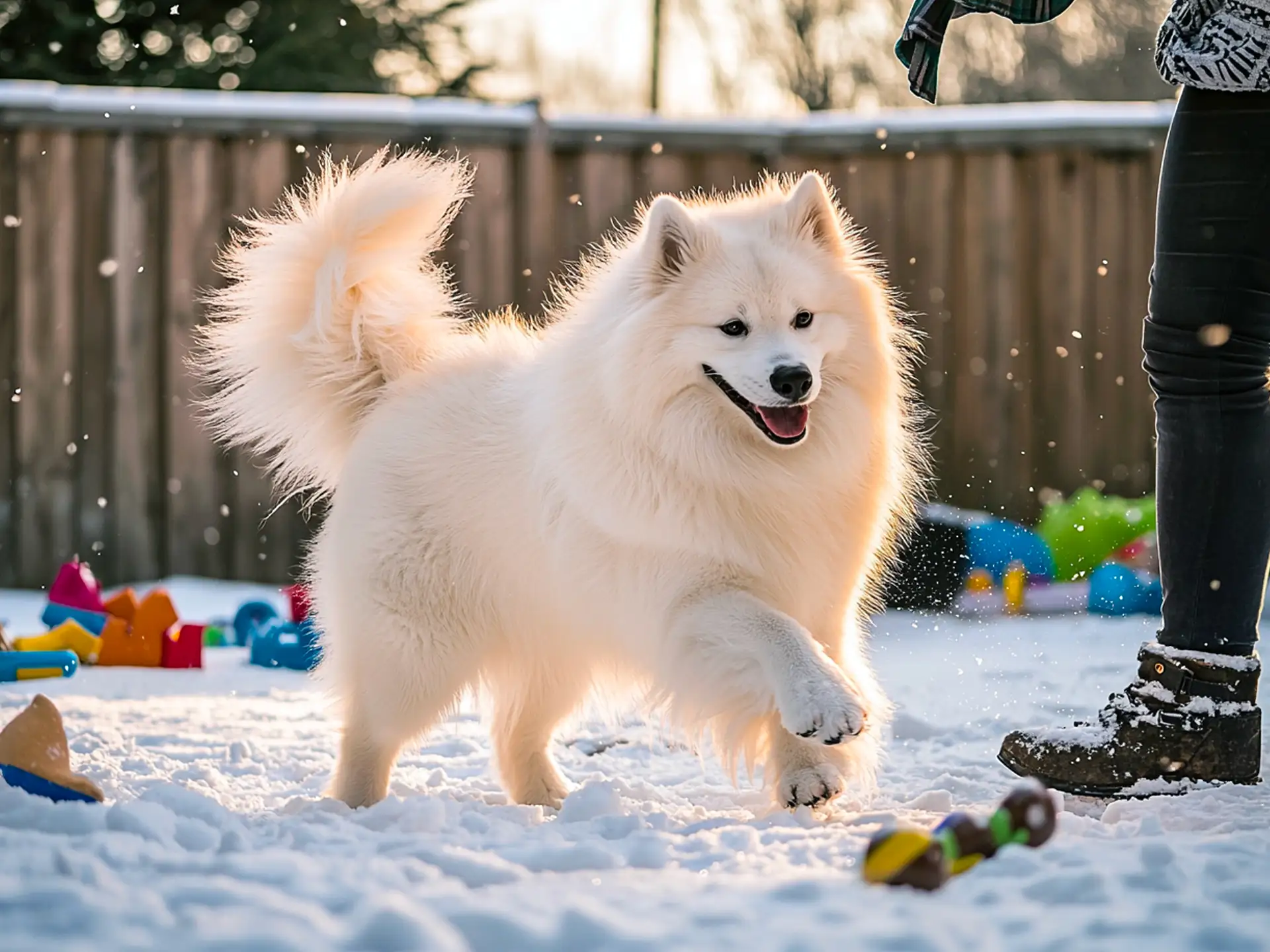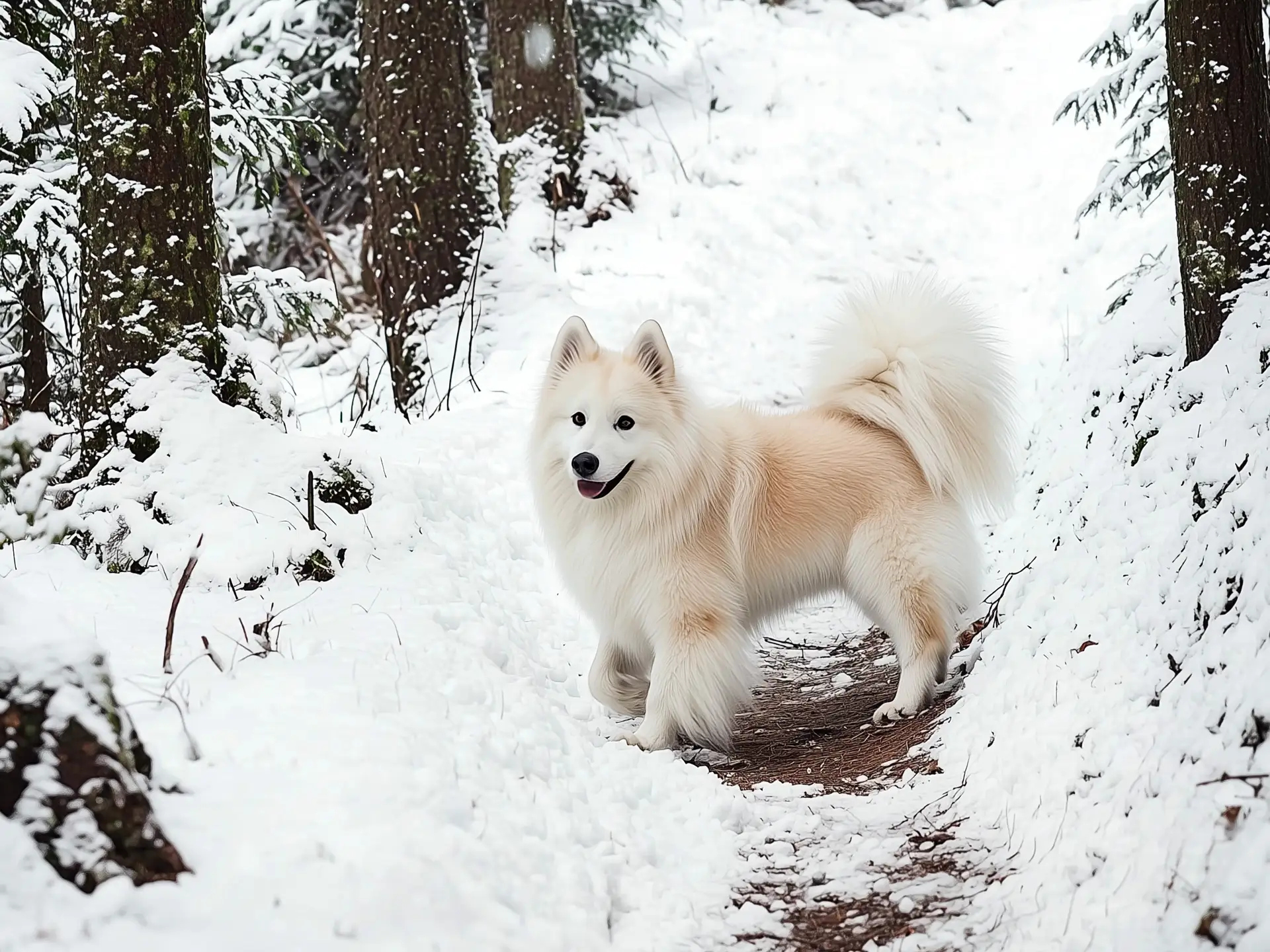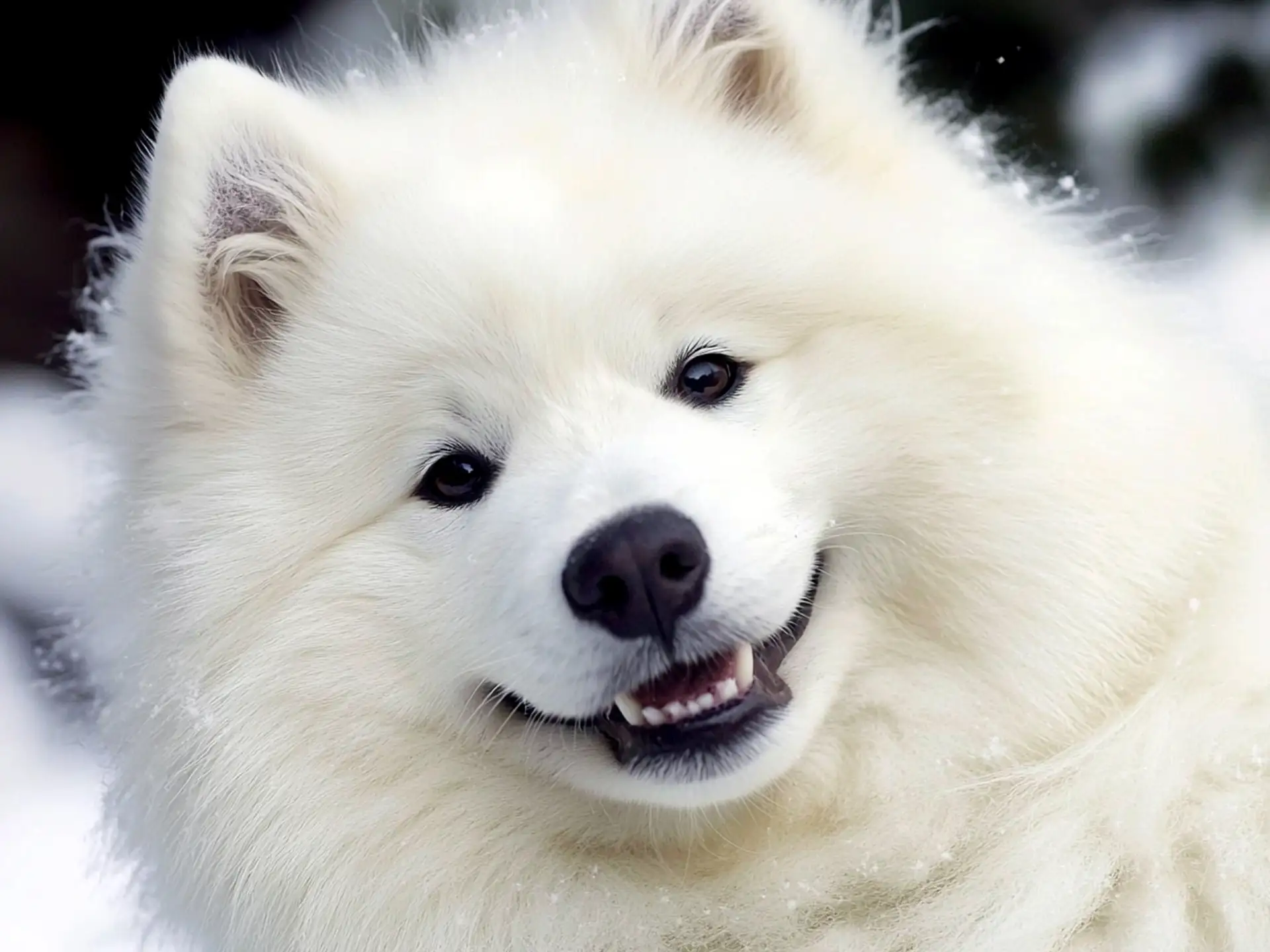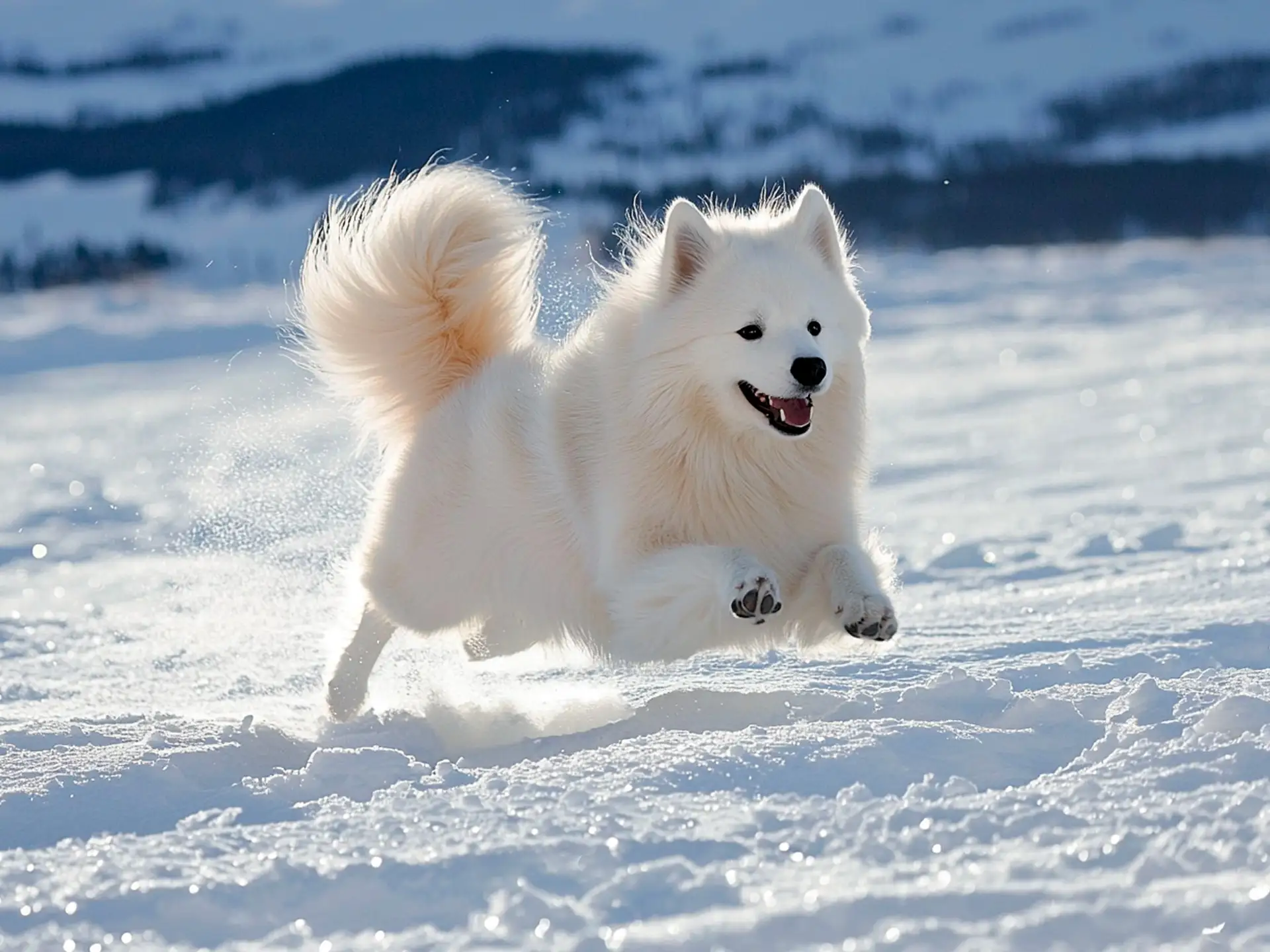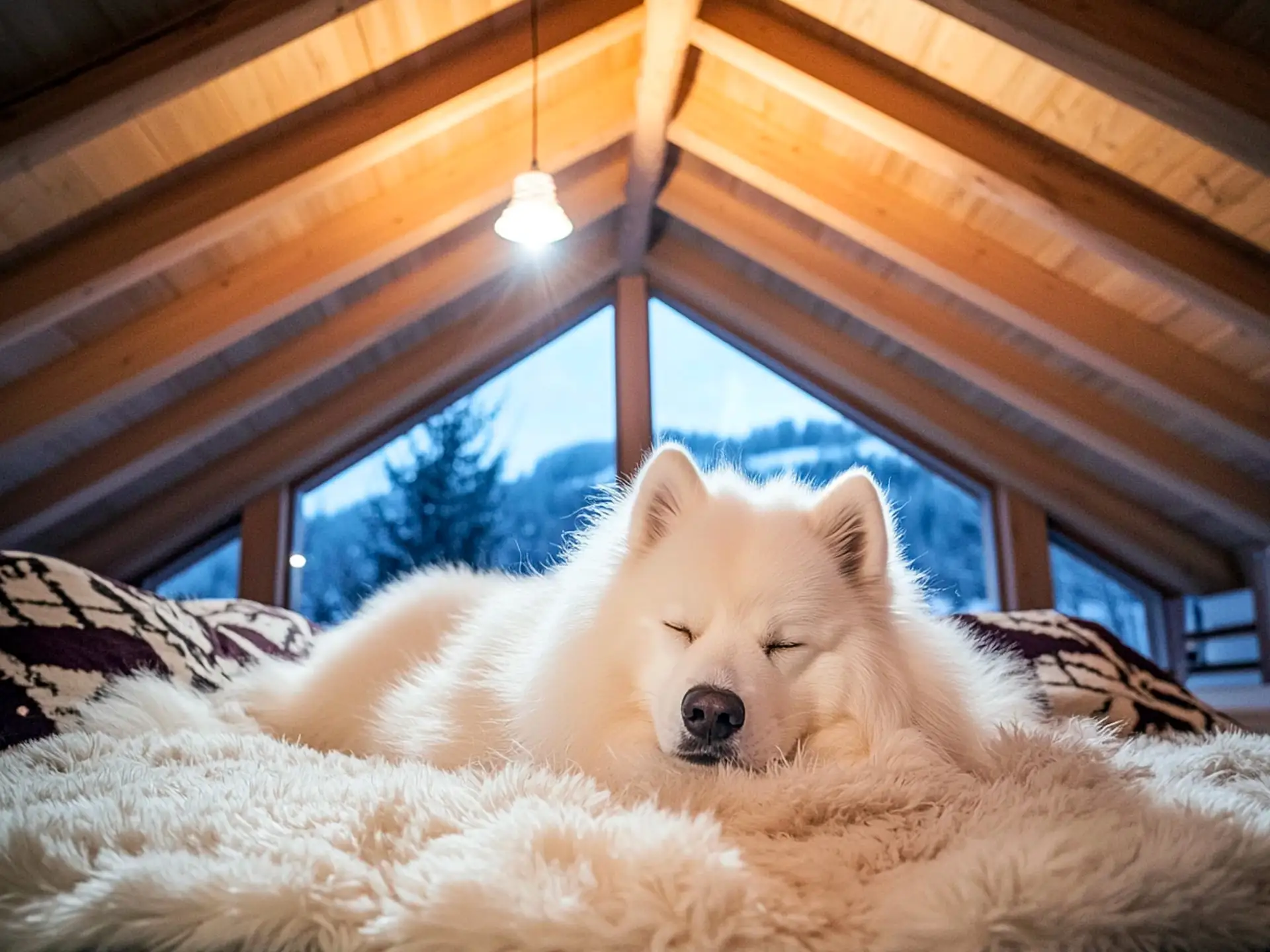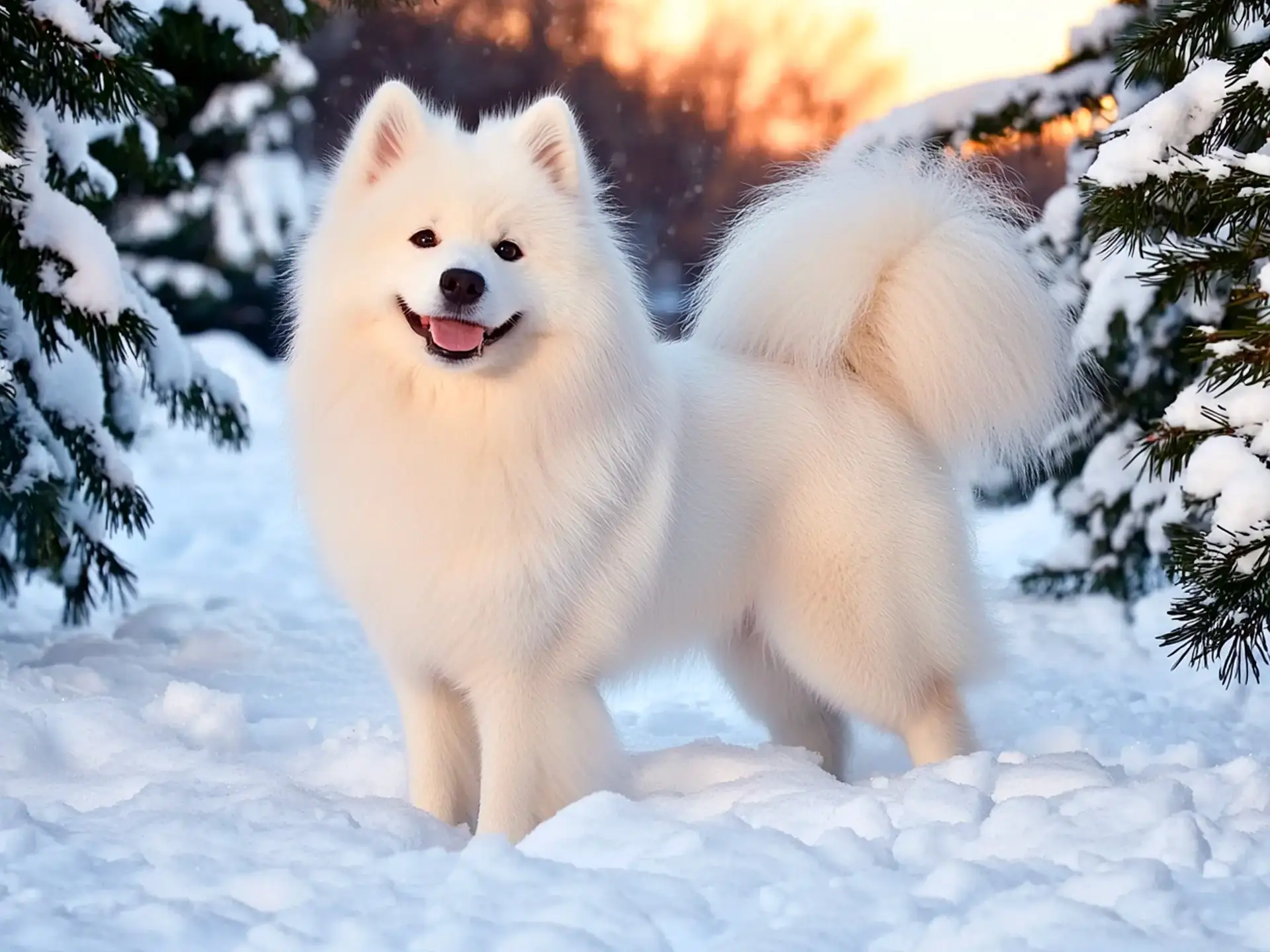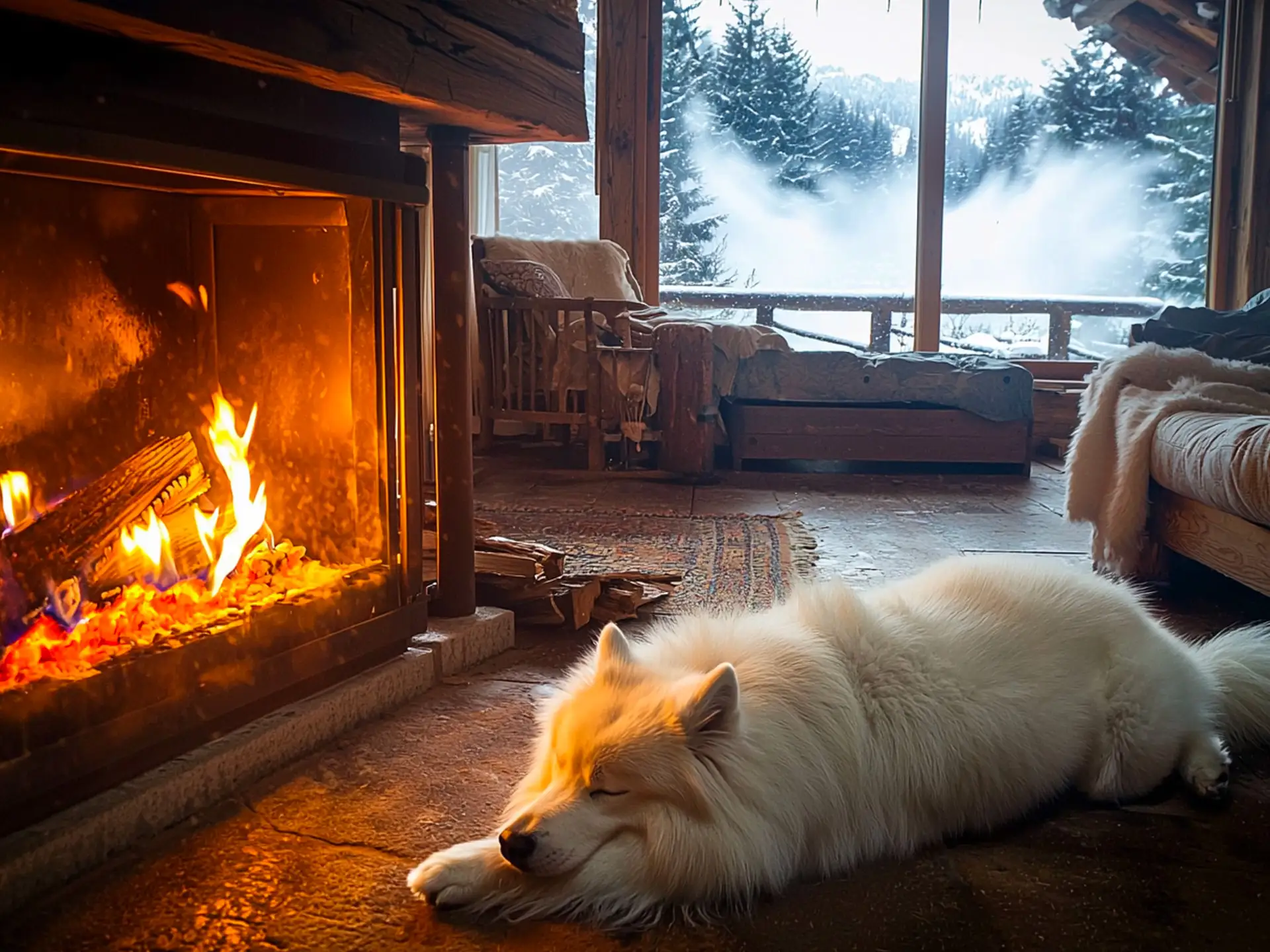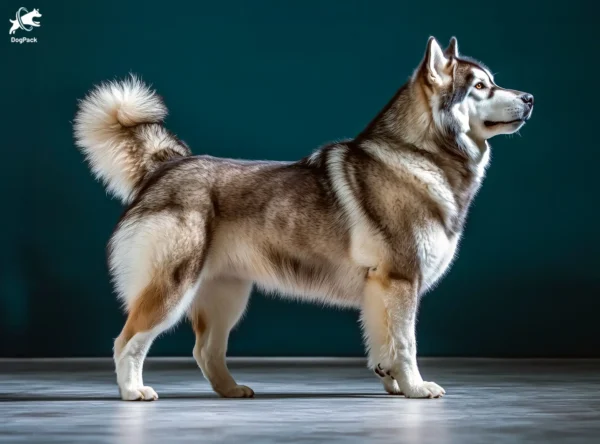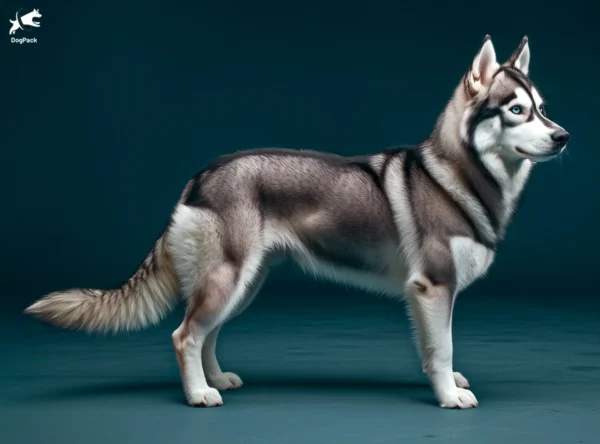Samoyed Dog Breed Info & Overview
The Samoyed, often described as a fluffy white cloud with a perpetual grin, is a breed full of charm and warmth. Originating from Siberia, these friendly and energetic dogs are known for their luxurious white coats and the iconic “Sammy smile.” Loyal and affectionate, Samoyeds make exceptional family companions, bringing joy and playfulness to any home—along with a bit of grooming dedication!
Characteristics
Pictures
Breed History
The Samoyed traces its roots back to the nomadic Samoyede people of Siberia, who relied on these dogs for herding reindeer, pulling sleds, and keeping them warm in the frigid Arctic temperatures. These dogs were integral to their survival, serving as companions and workers in one of the harshest climates on Earth.
Introduced to the Western world in the late 19th century, Samoyeds quickly captured hearts with their striking appearance and friendly demeanor. They were brought to England and played significant roles in Arctic and Antarctic explorations, including expeditions led by Fridtjof Nansen and Roald Amundsen, thanks to their endurance and resilience.
Over time, the Samoyed evolved from a working sled dog to a beloved family pet, while still retaining its strong work ethic and playful nature. Their signature “Sammy smile” not only endears them to humans but also prevents drooling, a useful trait in sub-zero temperatures to avoid icicles forming on their faces.
Temperament, Personality
Samoyeds are renowned for their friendly and affectionate nature, making them excellent companions for families and individuals alike. They thrive on human interaction and are known to form strong bonds with their owners, often displaying a gentle and loving demeanor that makes them wonderful therapy dogs.
These dogs are also highly sociable and generally get along well with children and other pets, especially when properly socialized from a young age. Their playful spirit means they enjoy engaging in games and activities, keeping both themselves and their families entertained.
However, Samoyeds are alert and can be somewhat vocal, making them good watchdogs who will announce the arrival of strangers. Their intelligence and sometimes independent streak mean they respond best to positive reinforcement and consistent training methods.
Physical Characteristics
Samoyeds are medium to large-sized dogs with a sturdy build and a thick, double-layered coat that is always white or biscuit in color. Their most distinguishing feature is their upturned mouth corners, giving them a perpetual “Sammy smile” that not only looks endearing but also prevents drooling.
Their almond-shaped, dark eyes are full of expression and intelligence, while the Samoyed’s ears are erect and triangular, adding to their alert appearance. The tail of a Samoyed is heavily plumed and typically curls over their back, especially when they are alert or excited.
Built for cold climates, their dense coat provides insulation against harsh weather. However, this also means they can be prone to overheating in warmer environments. Regular grooming is essential to maintain their coat’s health and to manage their heavy shedding.
Health Issues
Samoyeds are generally a healthy breed but are predisposed to certain genetic conditions. One common issue is hip dysplasia, a hereditary condition where the thigh bone doesn’t fit properly into the hip joint, potentially leading to arthritis or lameness over time.
Another concern is progressive retinal atrophy (PRA), a degenerative eye disorder that can lead to blindness. Regular eye check-ups can help detect and manage this condition early. Samoyeds may also be prone to diabetes, so monitoring their diet and regular veterinary check-ups are crucial.
Samoyed hereditary glomerulopathy, a kidney disease, is specific to the breed and can be serious, particularly in males. Genetic testing and responsible breeding practices help reduce the incidence of this disease. Maintaining a healthy weight and providing regular exercise also contribute to their overall well-being. According to the American Kennel Club, regular health screenings are recommended to detect any genetic conditions early.
Grooming Needs
The Samoyed’s thick double coat requires regular grooming to keep it in top condition. They shed heavily, especially during seasonal changes when they “blow” their coat. Daily brushing is recommended during these periods to remove loose hair and prevent matting.
Outside of shedding seasons, brushing them two to three times a week helps maintain their coat’s health and shine. Bathing should be done as needed, but not too frequently, to avoid stripping the natural oils from their skin, which can lead to dryness. If you’re interested in other breeds with similar grooming needs, check out our Large Dogs page.
Due to their fast-growing nails, regular trimming is essential to prevent discomfort and potential injuries. Additionally, checking and cleaning their ears weekly helps prevent infections. The Samoyed’s grooming routine can be time-consuming but is also a great opportunity for bonding.
Exercise Requirements
Samoyeds are an energetic breed that requires plenty of daily exercise to keep them happy and healthy. A minimum of one to two hours of physical activity per day is recommended, which can include walks, playtime, and mentally stimulating games.
These dogs thrive when given a job to do, reflecting their working heritage. Activities like agility training, obedience exercises, and even pulling carts or sleds can provide both physical and mental stimulation for a Samoyed. For more high-energy breeds, see our Working Dogs category.
Without adequate exercise, they may become bored and resort to undesirable behaviors like excessive barking or digging. Regular activity not only keeps them fit but also strengthens the bond between the Samoyed and their owner.
Training Tips
Samoyeds are intelligent but can also be independent thinkers, which may present a challenge during training. Positive reinforcement techniques work best, using rewards like treats, praise, and play to motivate them.
Consistency is key when training a Samoyed. Establishing clear rules and routines helps them understand what is expected. Early socialization is also crucial to ensure they are comfortable around different people, animals, and environments.
Due to their sociable nature, Samoyeds may struggle with separation anxiety if left alone for long periods. Incorporating crate training and gradually increasing alone time can help them adjust. Remember, patience and understanding go a long way with this breed.
Nutrition, Diet
Samoyeds have a high energy level, so their diet should consist of high-quality dog food rich in protein to support muscle development and sustain their activity. On average, an adult Samoyed may require between 1.5 to 2.5 cups of dry food per day, divided into two meals.
Because Samoyeds can be prone to obesity if overfed, it’s important to monitor their calorie intake and adjust portions based on their activity level and metabolism. Foods containing omega-3 fatty acids are beneficial for maintaining their thick coat and supporting joint health.
Some Samoyeds may have sensitivities to certain grains or proteins, so it’s advisable to consult with a veterinarian when selecting a diet. Fresh water should always be available, especially after exercise, to keep them well-hydrated.
Adoption, Breeders
If you’re considering adding a Samoyed to your family, it’s crucial to work with reputable breeders who prioritize health and temperament. The Samoyed Club of America provides a list of responsible breeders adhering to ethical breeding practices.
Adoption is another wonderful option. Rescue organizations like Samoyed Rescue Alliance specialize in rehoming Samoyeds in need of a loving home. They can help match you with a dog that fits your lifestyle and preferences.
Whether adopting or purchasing, always ask for health clearances for conditions common in Samoyeds, such as hip dysplasia and eye disorders. Meeting the parents can also give insight into the potential temperament and size of your future companion.
Family Pet?
Samoyeds make excellent family pets due to their affectionate and gentle nature. They are known to be particularly good with children, often exhibiting patience and a playful spirit that matches well with kids of all ages.
Their sociable disposition means they generally get along well with other dogs and even cats, especially if raised together from a young age. Proper socialization is key to fostering these positive relationships.
However, Samoyeds thrive on companionship and may become lonely if left alone for extended periods. Families that can provide plenty of attention, exercise, and mental stimulation will find the Samoyed a delightful addition to their home.
Right For You?
Before bringing a Samoyed into your life, consider whether you can meet their exercise and grooming needs. Their high energy levels require daily physical activity, and their heavy shedding means regular grooming is a must.
Samoyeds are best suited for active individuals or families who enjoy outdoor activities and can include their dog in these adventures. They may not be ideal for apartment living or hot climates due to their size and thick coat.
If you’re looking for a loyal, friendly companion and are prepared for the commitment, a Samoyed could be the perfect match. Their joyful disposition and unwavering affection can bring endless happiness to the right home.
Conclusion
In conclusion, the Samoyed is a delightful breed for those prepared to meet their specific needs. Their friendly and affectionate nature makes them wonderful companions, especially for active families who can provide ample exercise and attention. While their grooming requirements are significant, many owners find the time spent caring for their Samoyed strengthens their bond. Their intelligence and playful spirit add to their charm, making every day an adventure. If you’re ready for a loyal friend who brings joy and a bit of fluff into your life, the Samoyed might just be the perfect dog for you.
FAQs
-
Do Samoyeds do well in warm climates?
Samoyeds have a thick double coat designed for cold climates, which means they can overheat in warm weather. If you live in a hot area, extra precautions like providing shade, air conditioning, and limiting outdoor activities during peak heat are essential for a Samoyed’s comfort.
-
Are Samoyeds hypoallergenic dogs?
Despite their fluffy coats, Samoyeds are not hypoallergenic. They shed heavily and produce dander, which can trigger allergies in sensitive individuals. Regular grooming and cleaning can help manage allergens, but Samoyeds may not be suitable for those with severe allergies.
-
How vocal are Samoyed dogs?
Samoyeds are known to be quite vocal and may bark to communicate various needs or alert you to changes in their environment. Their tendency to “talk” can be endearing but may require training if excessive barking becomes an issue.
-
Can Samoyeds be left alone during the day?
Samoyeds thrive on companionship and may experience separation anxiety if left alone for long periods. They are best suited to households where someone is often present or where arrangements can be made to provide interaction throughout the day.
-
What activities do Samoyeds enjoy?
Samoyeds enjoy activities that engage both their mind and body, such as agility training, hiking, and sledding. They also love to play in the snow, reflecting their Arctic heritage. Providing varied activities helps keep a Samoyed happy and well-behaved.
Breed Ratings
Samoyeds are intelligent and can learn quickly, but their independent nature may require patience during training sessions.
This breed loves to play and enjoys engaging in games with family members, making them great companions for active households.
With high energy levels, Samoyeds need plenty of daily exercise to prevent boredom and maintain good health.
Samoyeds shed heavily, especially during seasonal changes, requiring regular grooming to manage their thick coat.
They have a moderate prey drive and may chase small animals, so supervision is recommended when around wildlife.
Due to their dense coat, grooming a Samoyed can be time-consuming, necessitating frequent brushing and maintenance.
While smart, Samoyeds can be stubborn. Consistent, positive training methods yield the best results with this breed.
Samoyeds prefer company and may develop separation anxiety if left alone for extended periods.
This breed is quite vocal and may bark or howl to express themselves or alert you to something.
Samoyeds drool very little, thanks to their upturned mouth corners that help keep them dry and prevent icicles.
Generally sociable, Samoyeds get along well with other dogs, especially when properly socialized.
They are generally healthy but can be prone to certain genetic conditions; regular vet check-ups are important.

